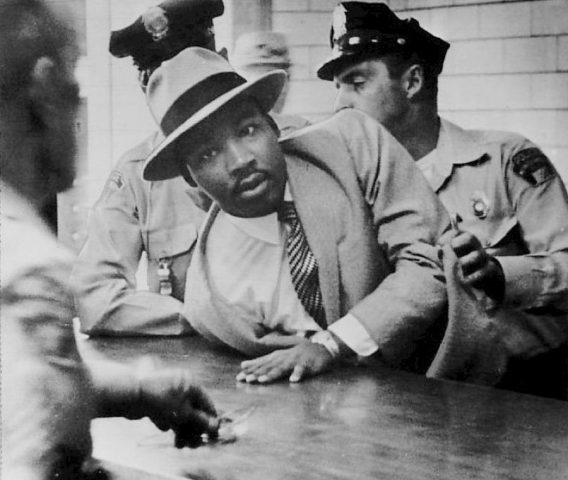What Pro-Lifers Can and CAN’T Learn from the Civil Rights Movement

OPINION: Tech Totalitarians Are Silencing Social Media Dissent
January 16, 2018
Ed Pentin: Vatican: Papal Honor for Pro-Abortion Politician Not a Sign of Support
January 16, 2018
By Jason Jones & John Zmirak, The Stream, January 15, 2018
 (January 15th) we mark the legacy of Martin Luther King, Jr. He’s not just some ethnic hero, but a true American one. He is even, in critical ways, a conservative paragon. We’ll lay out why, and draw out what the pro-life movement can — and cannot — learn from King’s success.
(January 15th) we mark the legacy of Martin Luther King, Jr. He’s not just some ethnic hero, but a true American one. He is even, in critical ways, a conservative paragon. We’ll lay out why, and draw out what the pro-life movement can — and cannot — learn from King’s success.
King a “conservative”? It seems absurd at first. King sparked massive change in American life. He radically unsettled the existing social order. He rejected calls for “prudence” and “gradual change.” He pointed to abstract principles to condemn concrete arrangements which had seemed to “work,” after a fashion, for 100 years since the Civil War.
His Civil Rights movement, however just its cause, did create a template for a long list of less worthy jihads, on behalf of disgruntled feminists, abortion mongers, and same-sex libertines. On that point, Southern conservatives proved sadly correct: overturning the racial hierarchy in America let a lot of other genies out of the bottle. Some of those spirits are afflicting the black community worse than segregation ever did (i.e., abortion).
No surprise that when King was organizing marches and sit-ins, most of the existing conservative movement opposed him. William F. Buckley and most of the writers at National Review were among them. But Buckley and NR came around as did most Americans. Here’s why:
More than almost any other political leader since Lincoln, King sought to polish the Golden Egg of liberty and equal opportunity, without doing violence to the Goose — that is, America as an orderly nation of laws. Both his arguments and his tactics bear that out.
Martin Luther King, Patriot
Arguing for civil rights, King did not appeal to the Marxist dialectic that so many of his allies had accepted. Nor did he latch onto the bastardized and racist pseudo-Islam that Malcolm X was peddling. No, King cited St. Thomas Aquinas and pointed to “natural law” that can overrule any legislation a nation passes — be it the Nuremberg Laws in Germany, or segregation in America. King pointed to the words of our nation’s founders, and called them a “promissory note” to America’s black citizens. And there really was no rational counter-argument to all that. He left his enemies weaponless, except for fire-hoses and truncheons.
Such thuggish means backfired on white supremacists, and turned the nation against them. But that need not have happened. The whole Civil Rights movement could have gone sidewise, and sparked mass civil conflict. That happened in Northern Ireland in the early 1970s, and it could well have happened here. There were three key factors that made the difference:
Non-Violence
King knew that one of the key psychological factors that had undergirded white supremacist laws since the days of slavery was fear of mass black violence. For centuries, some states had lived in the uneasy knowledge that in their midst were millions of strong, angry black men with grievances. The slave revolt in Haiti had terrified U.S. slaveholders. Nat Turner’s rebellion led states to outlaw manumission, and crack down on preachers who were teaching slaves how to read the Bible. So King insisted that every one of his activists who would violate unjust laws would not resist any violence. Not by police, and not by white vigilantes. Men underwent hours of training, taking blows and abuse from civil rights organizers, to learn how not to fight back.
This tactic was both principled and brilliant. But there was no guarantee that it would work. There’s nothing magical about non-violence. It doesn’t work in every situation. Gandhi famously made a fool of himself when he counseled Europe’s Jews to apply his non-violent methods against the Nazis. Such tactics can only prevail if two other factors stand in place:
A Nation with a Christian Conscience
In the mid-twentieth century, Britain was still largely Christian. English culture treasured a deep-seated sense of fair play and justice. Gandhi knew that when he confronted its colonial policies. His tactics would not have prevailed against the Germans. Hitler once offered Britain the unsolicited advice that it should “Hang Gandhi,” then every week hang more of his supporters until the Indian independence movement collapsed. No English government could have faced its voters if it had used tactics like that. That was true for one final reason. This factor was key to the success of both the Indian national struggle and the civil rights movement. Most of America was still Christian in some sense in the early 1960s as well.
A Free and Fair Press
Atrocities committed by British commanders were sure to be reported in the British national press. That gave the British public the chance to be outraged and demand a change of course. In the U.S., local Southern papers might have been committed to segregation. But national papers opposed it, and so did national TV and radio networks. They would cover the violence that segregationists and police used against non-violent demonstrators. And that would spark a moral backlash across the country.
With all these pieces in place, the moral violence of segregation would be seen in the public mind for what it was — because it was backed by physical violence. The bogeyman of black men as dangerous potential predators faded away, as dignified young black men in coats and ties patiently suffered abuse, without fighting back. Instead of new Nat Turners, they seemed like images of Christ. And a still-Christian nation began to be ashamed of itself.
Why Operation Rescue Failed
What happens when not all these crucial pieces are in place? Non-violent witness can be blunted, or silenced. In the 1980s, thousands of courageous pro-lifers across the country tried, via Operation Rescue, to apply King’s tactics to defending unborn children. They saved some babies, but as a national movement, they failed.
Pro-lifers held sit-ins in abortion mills. They went limp when police arrested them. They chained themselves to the front doors of Planned Parenthood clinics in the ghetto, and handed out leaflets about that group’s racist heritage. When police used violent tactics against old women and teenagers, pro-lifers didn’t resist. We know women whom burly cops subjected to “pain compliance” holds. The cops dislocated 14-year-old girls’ wrists with nun-chucks. In West Hartford, Connecticut and Los Angeles, California, the violence was especially bad — and it was all caught on videotape.
A pro-life demonstrator under assault by police in Los Angeles, 1989. https://calisphere.org/item/f0bffa49370892dd53402c1c3e091b8c/
But you would have to watch it at some pro-lifer’s house on a VCR. Because none of that footage was aired. The media were lockstep pro-choice, just as white Southern newspapers had been rabidly segregationist. There were no outside media who could pick up the story. So an epidemic of violence, and punitive jail sentences, against pro-life non-violent demonstrators fell into the memory hole. The movement failed.
Today, pro-lifers make extensive use of alternative, social media. The pro-life stings of James O’ Keefe, Lila Rose, David Daleiden and Sandra Merritt have been seen by millions of people. Students for Life of America, Movie To Movement, and the Susan B. Anthony List have leveraged social media to become enormous, effective movements.
But now these activists face open censorship by those social media platforms. Billion-dollar media corporations once again, as in the 1980s, could shut down a mass non-violent movement for human rights. If these companies get away with this abuse of power, we face the same national shame we would have deserved if Martin Luther King had died, obscure, in some Alabama prison.
__________________________
Jason Jones and John Zmirak are co-authors of the 2014 book The Race to Save Our Century.
Jason Jones is a Senior Contributor to The Stream. He is a film producer, author, activist and human rights worker. For the past 20+ years, he has worked to defend the most vulnerable — from the homeless on the streets of Los Angeles to persecuted Christians in Africa, from women in crisis pregnancies to victims of “honor killing” in Iran.
He attended the University of Hawaii, after a tour serving in the U.S. infantry. At UHI, he founded the Pro-Life Student Union and served as state chairman of Young Americans for Freedom. Jason would go on to serve as director of Hawaii Right to Life, national youth director of the American Life League, grassroots director of Brownback for President, and public relations director for the world’s largest international pro-life organization, Human Life International. He has appeared in defense of the most vulnerable members of the human family on ABC, Fox, CNN and hundreds of radio programs nationwide.
Jones is the Founder of HERO [Human-Rights Education and Relief Organization], a non-profit that promotes human dignity regardless of ability, age, status, race or geography. He spearheaded a HERO initiative to bring clean water to suffering refugees in South Sudan. In 2009, despite the government’s warning of unsafe travel, Jason visited Darfur and inspected 26 new water wells and distributed $2 million in food, medicine and other aid. He is currently leading an effort to provide emergency aid to the victims of ISIS in Iraq.
Jones was a producer on the 2006 prolife film, Bella, which won several film industry awards, most notably the People’s Choice Award at the 2006 Toronto International Film Festival.
He was the associate producer of the 2008 film on honor killings, The Stoning of Soraya M., which won the NAACP Image Award in 2010 as well as the Los Angeles Film Festival Audience Award in 2009.
His short films include Eyes to See (2010) and Crescendo (2011); Crescendo, whose executive producer was Patti Mallette (mother of Justin Bieber), raised millions of dollars for women and children in crisis pregnancy centers. He was producer in 2012 of the TV movie Mother Marianne: Portrait of a Saint.
Jones lives in Hawaii, with his wife and seven children.
John Zmirak is a Senior Editor of The Stream. He received his B.A. from Yale University in 1986, then his M.F.A. in screenwriting and fiction and his Ph.D. in English in 1996 from Louisiana State University. His focus was the English Renaissance, and the novels of Walker Percy. He taught composition at LSU and screenwriting at Tulane University, and has written screenplays for and with director Ronald Maxwell (Gods & Generals and Gettysburg). He was elected alternate delegate to the 1996 Republican Convention, representing Pat Buchanan.
He has been Press Secretary to pro-life Louisiana Governor Mike Foster, and a reporter and editor at Success magazine and Investor’s Business Daily, among other publications. His essays, poems and other works have appeared in First Things, The Weekly Standard, The Atlanta Journal-Constitution, USA Today, FrontPage Magazine, The American Conservative, The South Carolina Review, Modern Age, The Intercollegiate Review, Commonweal and The National Catholic Register, among other venues. He has contributed to American Conservatism: An Encyclopedia and The Encyclopedia of Catholic Social Thought. From 2000-2004, he served as Senior Editor of Faith & Family magazine and a reporter at The National Catholic Register. During 2012, he was editor of Crisis.
He is author or co-author of six books, including Wilhelm Ropke: Swiss Localist, Global Economist, The Grand Inquisitor (graphic novel) and most recently, The Race to Save Our Century. He was editor of the Intercollegiate Studies Institute’s guide to higher education, Choosing the Right College and Collegeguide.org, for ten years, and is also editor of Disorientation: How to Go to College Without Losing Your Mind.
He is a native of New York City, but now resides in Dallas, Texas.





